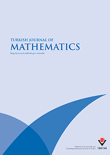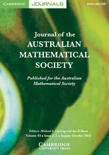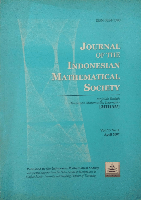
BULLETIN OF THE AMERICAN MATHEMATICAL SOCIETY
Scope & Guideline
Fostering dialogue in the evolving landscape of mathematics.
Introduction
Aims and Scopes
- Mathematical Theory and Foundations:
The journal publishes research that explores the theoretical underpinnings of mathematics, including topics like algebra, geometry, topology, and analysis. - Applied Mathematics and Computational Techniques:
It also emphasizes the application of mathematical principles in real-world scenarios, particularly in areas such as mathematical modeling, statistics, and computational mathematics. - Interdisciplinary Approaches:
The journal encourages interdisciplinary research that intersects mathematics with fields such as physics, engineering, economics, and computer science. - Innovation in Mathematical Proof and Reasoning:
A unique aspect of the journal is its focus on the evolution of mathematical proof techniques and the impact of automation and artificial intelligence on mathematical reasoning. - Historical Perspectives and Contributions:
It provides insights into historical developments in mathematics, celebrating contributions from notable mathematicians and their impact on contemporary research.
Trending and Emerging
- Artificial Intelligence in Mathematics:
Recent publications prominently feature discussions on the role of AI and machine learning in mathematical research, highlighting their potential to revolutionize proof methodologies and mathematical reasoning. - Automation of Mathematical Proofs:
There is a growing interest in the automation of proofs, as evidenced by numerous articles exploring proof assistants and their implications for future mathematical practices. - Interdisciplinary Applications:
A notable trend is the integration of mathematics with fields such as computer science, physics, and engineering, underlining the importance of collaborative research in solving complex problems. - Advanced Computational Techniques:
The journal is increasingly publishing works that leverage advanced computational methods, reflecting the mathematical community's shift towards data-driven and algorithmic approaches. - Philosophical Implications of Mathematics:
Emerging themes include the philosophical implications of machine involvement in mathematics, questioning traditional notions of proof and understanding in the mathematical community.
Declining or Waning
- Purely Historical Analyses:
There has been a noticeable reduction in papers that focus exclusively on historical analyses of mathematics without contemporary relevance, indicating a shift towards more applied and current mathematical discussions. - Elementary Number Theory:
Themes related to basic number theory seem to be less frequently published, suggesting a move towards more complex and abstract mathematical theories. - Traditional Proof Techniques:
The focus on classical proof techniques appears to be waning as the journal increasingly embraces automated proof methods and computational approaches. - Local Results in Pure Mathematics:
There is a decline in papers presenting local results without broader implications or applications, indicating a preference for research that contributes to global mathematical understanding. - Single-Domain Research:
Research confined to a single mathematical domain is less prominent, as the journal trends towards interdisciplinary studies that connect multiple mathematical fields.
Similar Journals

Turkish Journal of Mathematics
Fostering Excellence in Diverse Mathematical DisciplinesTurkish Journal of Mathematics is a prestigious academic publication dedicated to the advancement of mathematical research across a variety of subfields. Established in 1995 and published by the Tubitak Scientific & Technological Research Council Turkey, this journal has built a solid reputation, especially noted for its significant contributions to the field over the years, with its convergence spanning from 1995 to 2002 and again from 2006 to 2024. The journal, which holds a commendable Q2 ranking in Mathematics (miscellaneous) and is positioned in the 66th percentile of Scopus rankings for General Mathematics, aims to disseminate high-quality original research, reviews, and innovative methodologies to advance both theoretical and applied mathematics. Researchers, professionals, and students alike will find invaluable resources within its pages, providing insights that are pivotal for academic and practical applications in mathematics. Although it does not currently offer open access options, the journal remains an essential platform for those looking to engage with the forefront of mathematical inquiry.

JOURNAL OF THE AUSTRALIAN MATHEMATICAL SOCIETY
Unlocking the potential of mathematics for all.JOURNAL OF THE AUSTRALIAN MATHEMATICAL SOCIETY, published by Cambridge University Press, is a prestigious journal dedicated to advancing research and scholarship in the field of mathematics. With a long-standing history since its inception in 1959, the journal has established itself as a vital resource for mathematicians, researchers, and students worldwide. Operating under an Open Access model, it ensures that high-quality research is accessible to all, enhancing the dissemination of knowledge and fostering collaboration in the mathematical community. The journal holds a commendable Q2 ranking in the 2023 Mathematics (miscellaneous) category and is ranked #145 in Scopus among general mathematics journals, placing it in the 63rd percentile, which reflects its significant influence and reputation in the discipline. The JOURNAL OF THE AUSTRALIAN MATHEMATICAL SOCIETY continues to provide a platform for innovative mathematical research and critical discourse within the field, making it an invaluable asset for professionals and aspiring mathematicians alike.

Journal of the Indonesian Mathematical Society
Pioneering Discoveries in the Heart of Indonesia.Journal of the Indonesian Mathematical Society is an esteemed platform that serves as a vital conduit for the dissemination of research in various domains of mathematics. Published by the Indonesian Mathematical Society, this journal prioritizes fostering mathematical knowledge and innovation among scholars both regionally and globally. While it currently holds a Q4 ranking in the field of Mathematics (miscellaneous) and ranks within the lower percentile on Scopus, it actively encourages contributions from mathematicians that push the boundaries of current research trends. The journal, accessible at imsi.org/journal, emphasizes open access to ensure that findings reach a wider audience, thereby enhancing their impact. Located in Bandung, Indonesia, and set to converge its publication years from 2019 to 2024, it stands as an important venue for researchers, professionals, and students engaged in mathematical inquiry and advancement.

Korean Journal of Mathematics
Fostering Innovation in Mathematics Research.The Korean Journal of Mathematics, published by the Kangwon-Kyungki Mathematical Society, is an esteemed platform dedicated to advancing the field of mathematics. With an ISSN of 1976-8605 and E-ISSN of 2288-1433, the journal features a range of scholarly articles that emphasize both theoretical and applied aspects of mathematics, catering to researchers, professionals, and students alike. Although it is not open access, the journal maintains a commitment to academic rigor and integrity, ensuring high-quality contributions to the mathematical community. As it converges from years 2021 to 2024, the Korean Journal of Mathematics is poised to enhance its visibility within the Scopus database, currently ranking #354 out of 399 in the general mathematics category, reflecting its potential for growth and impact in the mathematical sciences. With its strategic focus and institutional backing from Kangwon National University, the journal serves as a vital resource for fostering research and dialogue in the ever-evolving landscape of mathematics.

Frontiers of Mathematics
Advancing Mathematical Frontiers for a Brighter TomorrowFrontiers of Mathematics, published by SPRINGER HEIDELBERG, is an emerging academic journal dedicated to fostering the advancement of mathematical sciences from 2023 to 2024. With an ISSN of 2731-8648 and E-ISSN of 2731-8656, this journal is positioned in the category of Q2 in the miscellaneous mathematics domain, showcasing its commitment to quality research and innovation. Although in its nascent stages, it has swiftly established a foothold within the global academic landscape, holding a Scopus rank of #198/399 and a median percentile of 50, indicating a promising trajectory. By providing an open-access option, Frontiers of Mathematics ensures broad dissemination of research findings, fostering collaboration and knowledge sharing across the mathematical community. Researchers, professionals, and students alike will find this journal to be an invaluable resource, contributing to important discussions and advancements in various mathematical fields.

BOLETIN DE LA SOCIEDAD MATEMATICA MEXICANA
Fostering Collaboration in the World of MathematicsBOLETIN DE LA SOCIEDAD MATEMATICA MEXICANA, published by Springer International Publishing AG, is a pivotal journal in the field of mathematics, particularly recognized for its contributions to the miscellaneous mathematics category, holding a commendable Q2 ranking as of 2023. With an ISSN of 1405-213X and an E-ISSN of 2296-4495, the journal serves as a platform for disseminating high-quality research and innovations from both national and international scholars. Operating from Switzerland, the journal encompasses a broad range of topics within mathematics, supporting the development and communication of mathematical knowledge. Although it is not open access, it remains a respected source for researchers, professionals, and students seeking to deepen their understanding of mathematical concepts and applications. Published continuously and rigorously since its converged years, BOLETIN DE LA SOCIEDAD MATEMATICA MEXICANA plays a crucial role in advancing mathematical discourse and collaboration across disciplines.

Bulletin of the Korean Mathematical Society
Highlighting Significant Contributions to MathematicsThe Bulletin of the Korean Mathematical Society is a premier journal published by the Korean Mathematical Society, aimed at disseminating significant advancements in the field of mathematics. With its ISSN 1015-8634, this journal serves as a vital resource for researchers, educators, and students seeking to stay abreast of contemporary mathematical developments. Although it currently does not offer open access, its rigorous peer-review process ensures the publication of high-quality research that adheres to international standards. Based in South Korea, the journal has demonstrated its commitment to advancing mathematical knowledge since its converged years, particularly from 2006 to 2024. Achieving a Q3 quartile ranking in Mathematics (Miscellaneous) for 2023, it holds a Scopus ranking of #298/399, placing it in the 25th percentile within its category. This positions the bulletin as a relevant outlet for emerging research and scholarly contributions, fostering a collaborative environment for academics worldwide.

ACTA MATHEMATICA SINICA-ENGLISH SERIES
Elevating Mathematical Discourse through Quality ScholarshipACTA MATHEMATICA SINICA-ENGLISH SERIES, published by SPRINGER HEIDELBERG, is a distinguished journal dedicated to the advancement of mathematical research across various domains, with a particular focus on both applied and theoretical mathematics. Established in Germany, this journal aims to foster a global dialogue among mathematicians by presenting high-quality articles that explore innovative methodologies, significant theoretical developments, and their applications in real-world problems. The journal is indexed in Scopus, achieving respectable rankings in its categories, particularly Q2 in Mathematics (miscellaneous) and Q3 in Applied Mathematics as of 2023. Though it does not offer open access, ACTA MATHEMATICA SINICA-ENGLISH SERIES remains a vital resource for researchers, professionals, and students seeking to stay informed on the latest mathematical findings and trends from 1991 to present. With its commitment to excellence, the journal serves as a platform for thought-provoking discussions and groundbreaking discoveries in the mathematical sciences.

Research in the Mathematical Sciences
Unveiling Innovations in Mathematical SciencesResearch in the Mathematical Sciences is a prestigious journal published by Springer International Publishing AG, specializing in a diverse range of mathematical disciplines. With an ISSN of 2522-0144 and an E-ISSN of 2197-9847, this journal operates out of Switzerland and has established a reputation for excellence in research dissemination since its inception in 2014. The journal is currently ranked in the highly regarded Q2 quartile for Applied Mathematics, Computational Mathematics, and Mathematics (miscellaneous), along with a Q3 rank in Theoretical Computer Science, reflecting its substantial influence within the academic community. Researchers will find great value in this journal as it features high-quality, peer-reviewed articles that contribute to the advancement of mathematical sciences. The journal promotes open access options, facilitating greater accessibility to innovative research findings. With its comprehensive scope and strong Scopus rankings, Research in the Mathematical Sciences serves as an essential resource for academics, professionals, and students eager to stay at the forefront of mathematical research and its applications.

TRANSACTIONS OF THE AMERICAN MATHEMATICAL SOCIETY
Connecting Scholars Through Rigorous Mathematical InquiryTRANSACTIONS OF THE AMERICAN MATHEMATICAL SOCIETY, published by the American Mathematical Society, is a premier journal in the field of mathematics that has been contributing to the advancement of mathematical knowledge since 1900. With an ISSN of 0002-9947 and an E-ISSN of 1088-6850, this journal holds a prestigious position in the academic landscape, evidenced by its Q1 rankings in both Applied Mathematics and Miscellaneous Mathematics categories as of 2023. With a Scopus ranking of #97 in General Mathematics and a percentile standing of 75th, the journal is recognized for its rigorous peer-review process and the quality of the research it publishes. Though it does not currently offer open access options, it essentially serves as a vital resource for researchers, professionals, and students seeking critical insights and developments in mathematical theory and applications. The Transactions aim to publish high-quality research articles that foster the exchange and dissemination of ideas, supporting the growth of both theoretical and applied mathematics within the global scholarly community.